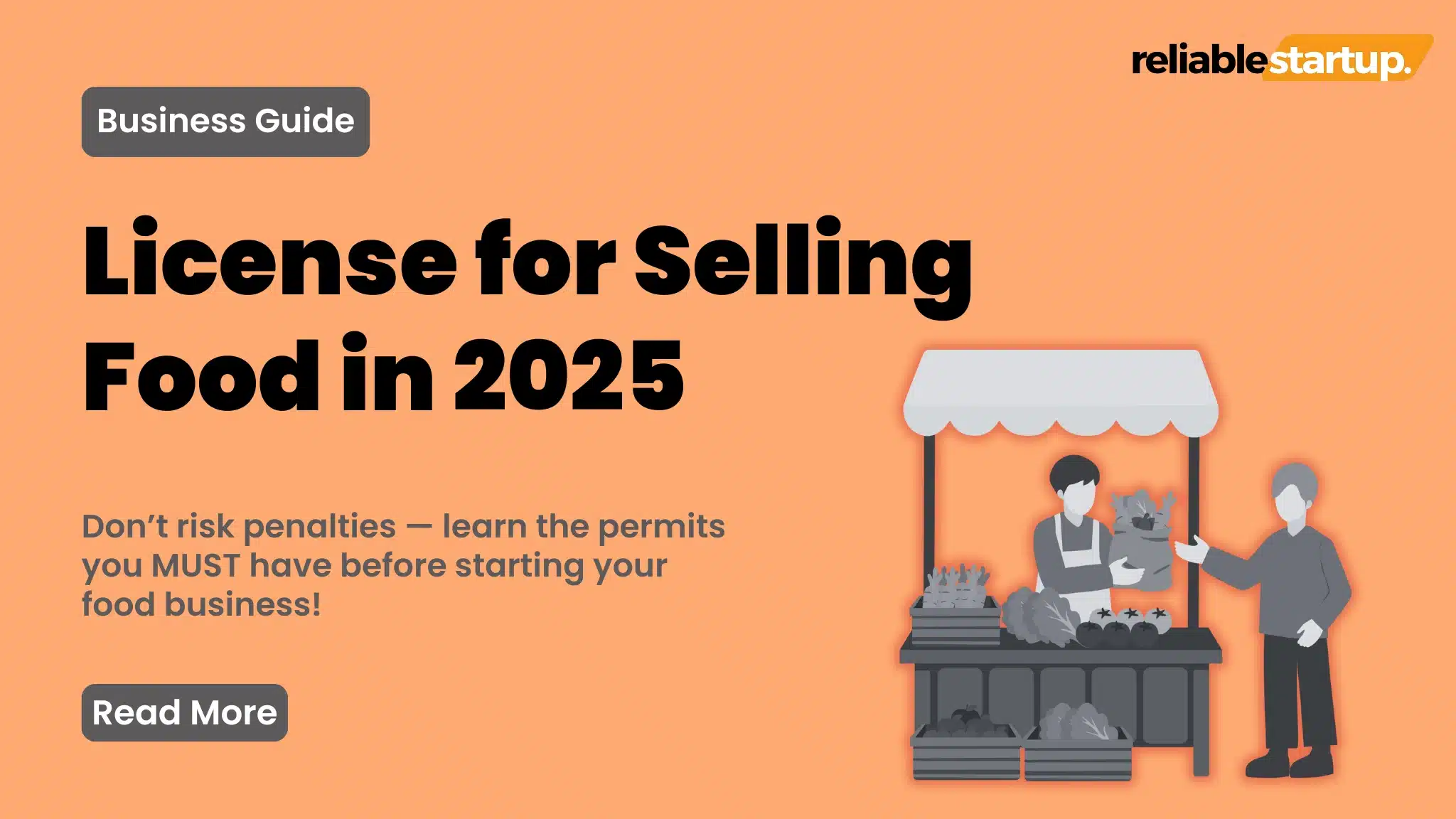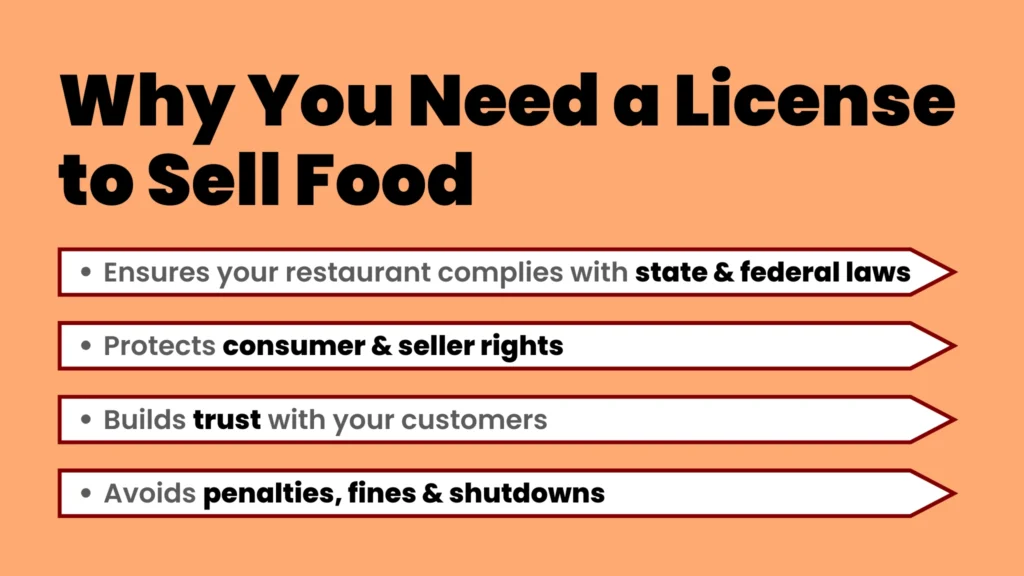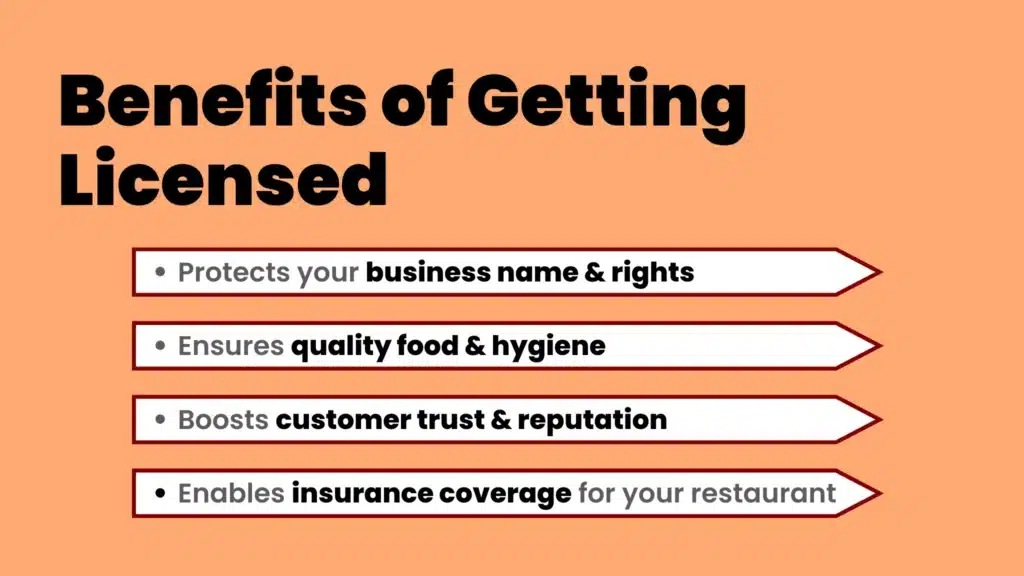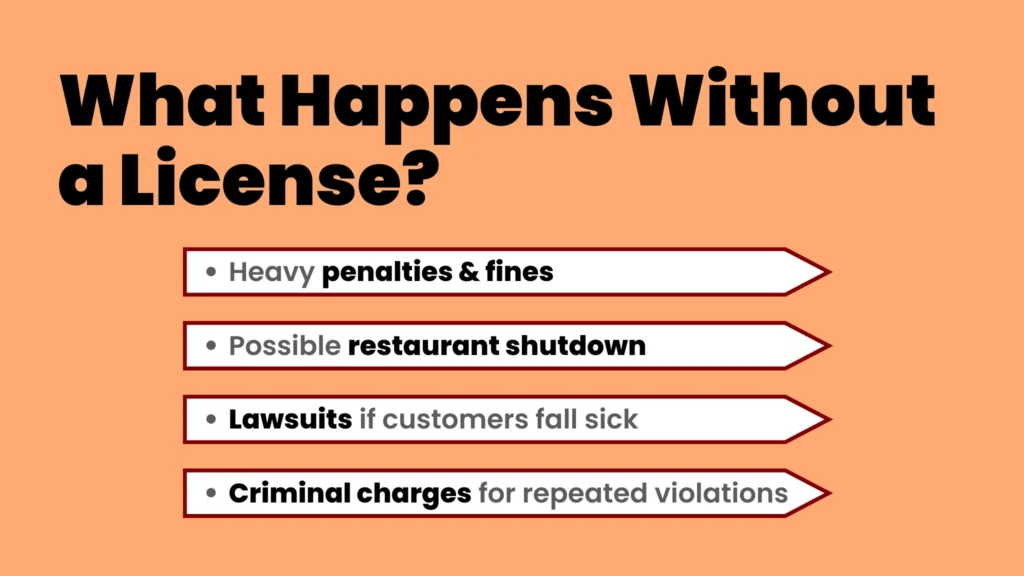Why Do You Require a License For Selling Food?

As the year 2025 is about to end and you are still keen on opening a restaurant. Keep in mind that there’s a lot of paperwork that needs to be filled before you even start to dream about owning a food business. But the important question you may ask yourself is what is the fuss behind requiring the license for selling food.
You may require dozens of licenses and permits for launching a restaurant and they all are meant to ensure the hotel or the restaurant has compliance with legal authorities and state laws.
It is not that you require licensing for selling drugs, wine and/or when you open pubs. Even for food restaurants local laws have been introduced to protect consumer and seller rights.
The license for food business and permits will take care of your business, particularly the product you will sell.
You will need Food and Drug Administration (FDA) approvals in this regard as well which comes under the jurisdiction of the Office of Inspections and Investigations and the state and/or local regulatory agencies within your geographic location or space.
Therefore, before you find yourself in a hole we have prepared a list of some important licences and permits that will enable you to sell food without any fuss. Stay with us!
Benefits of License for Selling Food
Although acquiring business licenses and permits cost you anywhere between $100 many a thousand bucks. But there are several benefits associated with them.
Licenses Protect Consumer & Seller Rights
The relevant licences and permits for selling food protects not only consumers but also the seller’s rights. For instance, you can take motivation from the fact that a trademark can serve as a legal entity for your business and no other corporation can copy your name. Similarly, the licenses are meant to ensure consumers stay relevant. They eat quality food.
Quality Food Chain & Hygienic Environment Attracts Customers
If your restaurant has quality food servings and is full of hygiene. It will more likely attract customers. The relevant FDA licenses and inspection protocols followed by the local Health Departments that ensure routine inspection visits. They all help in making efforts to sustain hygiene, quality food and food safety regulations.
Quality Control & Assurance
The licensing and permits allow the inspectors to frequently visit the restaurant to ensure it stays compliant to food safety and regulations. It pushes the staff to work rigorously on maintaining quality and assure brilliance in food preparation and keeping the dining as well as food preparation areas clean.
The Right Licensing For Insurance Coverage
When you go to obtain insurance, in case your machine or equipment malfunctions, breaks or some other unforced events occur, like the fire erupted. Insurance companies will demand from you a proof of proper licensing and/or permits before providing any coverage whatsoever.
Failing to produce such documents will be least likely to secure the coverage. Make sure to follow the instructions of any insurance or a coverage before signing one for your own convenience.
8 Must Licenses For Food Businesses
3 License Options For Registering a Food Business
To register a business you also need licensing. You need to find the perfect restaurant name, as well as purchase domains for websites. The business name you choose has to be unique and therefore you need to have several methods to ensure the same.
- Filing For the DBA: You can register your business name by filing for the DBA (doing business as). It ensures you have an operating name of a company, as opposed to its legal name.
- Business Structure Creation: You can create a structure for your food business. It can be a sole proprietorship, Limited Liability Company (LLC) or corporation based biz.
- File Trademark For Your Food Business: When you file a trademark it generally protects anything used to identify your business from others. Trademarks are symbols, words, graphics and/or images that indicate the source of the goods and services produced.
Acquire a Business License For Food Business
To operate a food business across multiple locations in several states you need a business license. A business license is one of the most important restaurant licenses and permits to function across the United States.
You can check the SBA’s official website to read those state specific business rules for obtaining the license. It acts as a permission from the local government or state bodies and generally costs anywhere between $50 to a few hundred dollars for most food licensing applications.
Certification of Property & Sign Permit
The certification of occupancy or the property ensures your building has compliance with safety procedures and has been properly constructed and maintained. You can visit the local building or zoning department in your city to issue you a certificate of occupancy.
Prior to issuance they can conduct a series of inspections, for instance, plumbing, electrical, fire safety and general building inspection.
Your local government issues you a sign permit. It is needed when you open a restaurant in areas which are bounded by standards like the minimum acceptable size, location and lighting, though varying city to city and state basis. For rental restaurants you need a written approval from your landlord before going along with the official sign permit.
Food Licensing For Serving & Handling Permits
The city or the county health department issues a food license to ensure what you sell adheres to the food safety regulations. The licensing is simple as the health department visits your place to inspect your restaurant. If the food you sell fails any of their inspections, you can potentially lose your food service license.
On the other hand food handling permits are also commonly referred to as Employee health permits. As they make sure your working staff has completed a food safety certification.
It implements regulations for food sanitation, storage, protection and preparation. You can suggest your staff to participate in online courses. Pass the exam and print the certificate. It cost around $100 bucks to $600.
Music License Purchases to Avoid Copyright
To avoid the copyright infringement on music played during customers enjoying dining inside the restaurant. You need licensing from performance rights organizations.
For instance, BMI, ASCAP or SESAC helps you to avoid copyright infringement at a cost of $300 to 1000 for playing background music.
If the owner of the music finds out you have played a copyrighted music without a licence, he can sue you or a fine worth $700 to as big as $40K can be imposed by authorities on your food business. Hence, a music license for selling food is important as well.
Sales Tax Collection Certificate
Another important license for selling food is tax collection certification. It helps the restaurant collect the sales tax from the consumer directly.
Though, you may need to apply for it without paying any fee yet the authorities may charge you some bucks as security deposits. It can dearly help the authorities if the restaurant gets shut down due to unforced events and you have tax obligations that need to be paid.
Acquire Valet Parking Permits
One of the important licences for selling food is to ensure you offer valet parking to your guests. In doing so you need a detailed plan of the designated pickup and drop off area as well as the number of parking spaces. Furthermore, the relevant authorities can ask for a letter of agreement between you and your preferred vendor.
The Food Truck or a Vehicle Permit
Food trucks and other vehicles that work for your restaurants need approvals by the authorities. It enables the operation of your vehicles in the state and/or area. If you fail to obtain the same, you may lose operations in that specific location or a state.
FAQs: License for Selling Food
What is the most critical license for selling food?
Although every single permit and license for selling food is important in its own domain. However, you can never skip the business license. It serves as a legal permission to operate your restaurant. If you do not have it your restaurant business can not operate lawfully.
Do I need to apply for a food handler’s permit?
The food handler permit ensures you hire workers who have completed food safety training. It includes all the staff, which is involved in food preparation, storage, or other cleaning services needed for proper hygiene and food handling practices.
Do I walk free if I don’t obtain licenses and permits?
If authorities find you operating in the U.S. without proper licenses and food permits, you won’t walk free. You will face financial, legal, and reputational consequences.
Authorities can fine you anywhere from a few hundred to several thousand dollars. Repeating the violation can lead them to temporarily or permanently shut down your food business. If a customer gets sick after eating at your restaurant, they can sue you. For repeated offenses and serious violations, you may even face criminal charges or jail time.
The Bottom Line: License for Selling Food
Obtaining any sort of license for selling food is important. It serves as a documentation to stay compliant to legal authorities and/or state laws. Moreover, the name permit protects your business by preventing other corporations or entities from using your name.
They are of several types, for instance, you can acquire licensing for registering a business, occupancy, music rights, sale tax collection, etc.
Similarly, the permits help the restaurants to focus on quality food servings and customer handling. They act like a minimum threshold needed to approve only those food chains which are hygienic and follow food safety regulations and standards. Stay tuned with Reliable Startup for further info like this!










